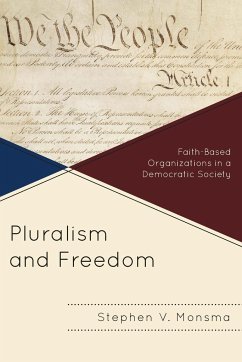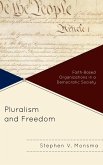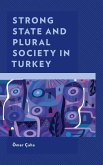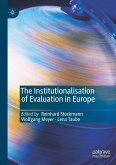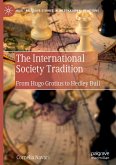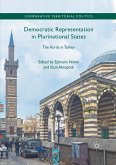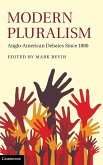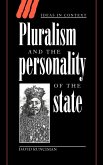- Broschiertes Buch
- Merkliste
- Auf die Merkliste
- Bewerten Bewerten
- Teilen
- Produkt teilen
- Produkterinnerung
- Produkterinnerung
In Pluralism and Freedom, Stephen Monsma explores the question: How much autonomy should faith-based organizations retain when they enter the public realm? He contends that pluralism and freedom demand their religious freedom be respected, but that freedom of all religious traditions and of the general public and secular groups be equally respected, ideals that neither the left nor the right live up to. With an all new Afterword and up-to-date insights into religious/political debates both old and new - from the morning after pill to the recent Supreme Court decision overturning the Defense of…mehr
Andere Kunden interessierten sich auch für
![Pluralism and Freedom Pluralism and Freedom]() Stephen V. MonsmaPluralism and Freedom115,99 €
Stephen V. MonsmaPluralism and Freedom115,99 €![Strong State and Plural Society in Turkey Strong State and Plural Society in Turkey]() Ömer ÇahaStrong State and Plural Society in Turkey119,99 €
Ömer ÇahaStrong State and Plural Society in Turkey119,99 €![The Institutionalisation of Evaluation in Europe The Institutionalisation of Evaluation in Europe]() The Institutionalisation of Evaluation in Europe112,99 €
The Institutionalisation of Evaluation in Europe112,99 €![The International Society Tradition The International Society Tradition]() Cornelia NavariThe International Society Tradition104,99 €
Cornelia NavariThe International Society Tradition104,99 €![Democratic Representation in Plurinational States Democratic Representation in Plurinational States]() Democratic Representation in Plurinational States49,99 €
Democratic Representation in Plurinational States49,99 €![Modern Pluralism Modern Pluralism]() Modern Pluralism119,99 €
Modern Pluralism119,99 €![Pluralism and the Personality of the State Pluralism and the Personality of the State]() David RuncimanPluralism and the Personality of the State129,99 €
David RuncimanPluralism and the Personality of the State129,99 €-
-
-
In Pluralism and Freedom, Stephen Monsma explores the question: How much autonomy should faith-based organizations retain when they enter the public realm? He contends that pluralism and freedom demand their religious freedom be respected, but that freedom of all religious traditions and of the general public and secular groups be equally respected, ideals that neither the left nor the right live up to. With an all new Afterword and up-to-date insights into religious/political debates both old and new - from the morning after pill to the recent Supreme Court decision overturning the Defense of Marriage Act - this book provides both a history and a snapshot of an increasingly pluralistic America, and where our free and faithful nation goes from here.
Hinweis: Dieser Artikel kann nur an eine deutsche Lieferadresse ausgeliefert werden.
Hinweis: Dieser Artikel kann nur an eine deutsche Lieferadresse ausgeliefert werden.
Produktdetails
- Produktdetails
- Verlag: Rowman & Littlefield Publishers
- Seitenzahl: 260
- Erscheinungstermin: 5. Dezember 2013
- Englisch
- Abmessung: 229mm x 152mm x 15mm
- Gewicht: 427g
- ISBN-13: 9781442214316
- ISBN-10: 1442214317
- Artikelnr.: 39402241
- Herstellerkennzeichnung
- Libri GmbH
- Europaallee 1
- 36244 Bad Hersfeld
- gpsr@libri.de
- Verlag: Rowman & Littlefield Publishers
- Seitenzahl: 260
- Erscheinungstermin: 5. Dezember 2013
- Englisch
- Abmessung: 229mm x 152mm x 15mm
- Gewicht: 427g
- ISBN-13: 9781442214316
- ISBN-10: 1442214317
- Artikelnr.: 39402241
- Herstellerkennzeichnung
- Libri GmbH
- Europaallee 1
- 36244 Bad Hersfeld
- gpsr@libri.de
Stephen V. Monsma is a senior research fellow at the Henry Institute, Calvin College, and professor of political science emeritus at Pepperdine University.
Preface Chapter 1: The Issue that Will Not Go Away Diversity, Pluralism,
and Autonomy Two Sets of Questions A Conflict of Theoretical Concepts The
Plan of the Book Chapter 2: Faith-Based Organizations and the Network of
Human Services Faith-Based Organizations in the Nonprofit and Voluntary
Sector International Emergency Relief and Long-Term Development Faith-Based
Organizations in International Relief and Development The Added Value of
Faith-Based and Other Nongovernmental Organizations. The Role of Faith in
Faith-Based Organizations. Adoption and Foster Care Services Faith-Based
Organizations in Adoption and Foster Care Services The Added Value of
Faith-Based Organizations. The Role of Faith in Faith-Based Organizations.
The Michigan Prisoner Reentry Initiative (MPRI) Faith-Based Organizations
in the MPRI. The Added Value of Faith-Based Organizations The Role of Faith
in Faith-Based Organizations. Conclusions Chapter 3: The Seedbeds of
Attitudes towards Faith-Based Organizations The Liberal Enlightenment, the
Founding Era, and the Young Nation The Eighteenth Century Enlightenment in
Europe The Eighteenth Century Enlightenment and the American Founders
Religion in the Founding Era and the Young Nation The Legacy of the
Founding Era and the Young Nation The Supreme Court, Church-State
Relations, and Faith-Based Organizations The Strict Separation,
No-Aid-to-Religion Standard The Equal Treatment, Neutrality Standard The
Accommodationist Standard The Continuing Strength of the Strict Separation,
No-Aid-to-Religion Standard The Inadequacy of the Strict Separation,
No-Aid-to-Religion Standard The Supreme Court and Freedom of Association
Summary Nondiscrimination Measures and Faith-Based Organizations The 1960s
Nondiscrimination Civil Rights Laws The Legacy of Nondiscrimination Laws
Conclusions Chapter 4: The Partisan-Political Landscape Today Faith-Based
Organizations and the Left The Left's Mindset towards Faith-Based
Organizations in the Public Realm Applications of the Left's Mindset
towards Faith-Based Organizations in the Public Realm Faith-Based
Organizations and the Right The Right's Mindset towards Faith-Based
Organizations in the Public Realm Applications of the Right's Mindset
towards Faith-Based Organizations in the Public Realm Chapter 5: Structural
Pluralism in Christian Democratic Thought Religious Freedom in the Context
of Church-State Separation Structural Pluralism and Christian Democracy
Origins in Nineteenth Century Events and Political Currents Personalism The
Pluralism of Structural Pluralism Subsidiarity in Roman Catholic Social
Thought. Sphere Sovereignty in Dutch neo-Calvinist Thought. Common Ground
between Catholics and Protestants: Contemporary Structural Pluralism
Structural Pluralism and the American Polity. Chapter 6: Faith-Based
Organizations a Pluralistic Public Square: Applications Three Basic
Perspectives A Respect for Religion and Its Role in the Public Policy World
Faith-Based Organizations Possess Religious Freedom and Autonomy Rights
Substantive Religious Neutrality as the Key to Freedom of Religion Specific
Issues: Government Funds and Religious Hiring Rights Structural Pluralism's
Answer Objections to the Structural Pluralist Position Specific Issues:
Religious Elements in Government Subsidized Services Structural Pluralism's
Answer Objections to the Structural Pluralist Position Specific Issues:
Nondiscrimination and Hiring and Membership Standards Structural
Pluralism's Answer Objections to the Structural Pluralist Position Specific
Issues: Requiring Faith-Based Organizations to Provide Services They Find
Religiously Objectionable Structural Pluralism's Answer Objections to the
Structural Pluralist Position Bibliography
and Autonomy Two Sets of Questions A Conflict of Theoretical Concepts The
Plan of the Book Chapter 2: Faith-Based Organizations and the Network of
Human Services Faith-Based Organizations in the Nonprofit and Voluntary
Sector International Emergency Relief and Long-Term Development Faith-Based
Organizations in International Relief and Development The Added Value of
Faith-Based and Other Nongovernmental Organizations. The Role of Faith in
Faith-Based Organizations. Adoption and Foster Care Services Faith-Based
Organizations in Adoption and Foster Care Services The Added Value of
Faith-Based Organizations. The Role of Faith in Faith-Based Organizations.
The Michigan Prisoner Reentry Initiative (MPRI) Faith-Based Organizations
in the MPRI. The Added Value of Faith-Based Organizations The Role of Faith
in Faith-Based Organizations. Conclusions Chapter 3: The Seedbeds of
Attitudes towards Faith-Based Organizations The Liberal Enlightenment, the
Founding Era, and the Young Nation The Eighteenth Century Enlightenment in
Europe The Eighteenth Century Enlightenment and the American Founders
Religion in the Founding Era and the Young Nation The Legacy of the
Founding Era and the Young Nation The Supreme Court, Church-State
Relations, and Faith-Based Organizations The Strict Separation,
No-Aid-to-Religion Standard The Equal Treatment, Neutrality Standard The
Accommodationist Standard The Continuing Strength of the Strict Separation,
No-Aid-to-Religion Standard The Inadequacy of the Strict Separation,
No-Aid-to-Religion Standard The Supreme Court and Freedom of Association
Summary Nondiscrimination Measures and Faith-Based Organizations The 1960s
Nondiscrimination Civil Rights Laws The Legacy of Nondiscrimination Laws
Conclusions Chapter 4: The Partisan-Political Landscape Today Faith-Based
Organizations and the Left The Left's Mindset towards Faith-Based
Organizations in the Public Realm Applications of the Left's Mindset
towards Faith-Based Organizations in the Public Realm Faith-Based
Organizations and the Right The Right's Mindset towards Faith-Based
Organizations in the Public Realm Applications of the Right's Mindset
towards Faith-Based Organizations in the Public Realm Chapter 5: Structural
Pluralism in Christian Democratic Thought Religious Freedom in the Context
of Church-State Separation Structural Pluralism and Christian Democracy
Origins in Nineteenth Century Events and Political Currents Personalism The
Pluralism of Structural Pluralism Subsidiarity in Roman Catholic Social
Thought. Sphere Sovereignty in Dutch neo-Calvinist Thought. Common Ground
between Catholics and Protestants: Contemporary Structural Pluralism
Structural Pluralism and the American Polity. Chapter 6: Faith-Based
Organizations a Pluralistic Public Square: Applications Three Basic
Perspectives A Respect for Religion and Its Role in the Public Policy World
Faith-Based Organizations Possess Religious Freedom and Autonomy Rights
Substantive Religious Neutrality as the Key to Freedom of Religion Specific
Issues: Government Funds and Religious Hiring Rights Structural Pluralism's
Answer Objections to the Structural Pluralist Position Specific Issues:
Religious Elements in Government Subsidized Services Structural Pluralism's
Answer Objections to the Structural Pluralist Position Specific Issues:
Nondiscrimination and Hiring and Membership Standards Structural
Pluralism's Answer Objections to the Structural Pluralist Position Specific
Issues: Requiring Faith-Based Organizations to Provide Services They Find
Religiously Objectionable Structural Pluralism's Answer Objections to the
Structural Pluralist Position Bibliography
Preface Chapter 1: The Issue that Will Not Go Away Diversity, Pluralism,
and Autonomy Two Sets of Questions A Conflict of Theoretical Concepts The
Plan of the Book Chapter 2: Faith-Based Organizations and the Network of
Human Services Faith-Based Organizations in the Nonprofit and Voluntary
Sector International Emergency Relief and Long-Term Development Faith-Based
Organizations in International Relief and Development The Added Value of
Faith-Based and Other Nongovernmental Organizations. The Role of Faith in
Faith-Based Organizations. Adoption and Foster Care Services Faith-Based
Organizations in Adoption and Foster Care Services The Added Value of
Faith-Based Organizations. The Role of Faith in Faith-Based Organizations.
The Michigan Prisoner Reentry Initiative (MPRI) Faith-Based Organizations
in the MPRI. The Added Value of Faith-Based Organizations The Role of Faith
in Faith-Based Organizations. Conclusions Chapter 3: The Seedbeds of
Attitudes towards Faith-Based Organizations The Liberal Enlightenment, the
Founding Era, and the Young Nation The Eighteenth Century Enlightenment in
Europe The Eighteenth Century Enlightenment and the American Founders
Religion in the Founding Era and the Young Nation The Legacy of the
Founding Era and the Young Nation The Supreme Court, Church-State
Relations, and Faith-Based Organizations The Strict Separation,
No-Aid-to-Religion Standard The Equal Treatment, Neutrality Standard The
Accommodationist Standard The Continuing Strength of the Strict Separation,
No-Aid-to-Religion Standard The Inadequacy of the Strict Separation,
No-Aid-to-Religion Standard The Supreme Court and Freedom of Association
Summary Nondiscrimination Measures and Faith-Based Organizations The 1960s
Nondiscrimination Civil Rights Laws The Legacy of Nondiscrimination Laws
Conclusions Chapter 4: The Partisan-Political Landscape Today Faith-Based
Organizations and the Left The Left's Mindset towards Faith-Based
Organizations in the Public Realm Applications of the Left's Mindset
towards Faith-Based Organizations in the Public Realm Faith-Based
Organizations and the Right The Right's Mindset towards Faith-Based
Organizations in the Public Realm Applications of the Right's Mindset
towards Faith-Based Organizations in the Public Realm Chapter 5: Structural
Pluralism in Christian Democratic Thought Religious Freedom in the Context
of Church-State Separation Structural Pluralism and Christian Democracy
Origins in Nineteenth Century Events and Political Currents Personalism The
Pluralism of Structural Pluralism Subsidiarity in Roman Catholic Social
Thought. Sphere Sovereignty in Dutch neo-Calvinist Thought. Common Ground
between Catholics and Protestants: Contemporary Structural Pluralism
Structural Pluralism and the American Polity. Chapter 6: Faith-Based
Organizations a Pluralistic Public Square: Applications Three Basic
Perspectives A Respect for Religion and Its Role in the Public Policy World
Faith-Based Organizations Possess Religious Freedom and Autonomy Rights
Substantive Religious Neutrality as the Key to Freedom of Religion Specific
Issues: Government Funds and Religious Hiring Rights Structural Pluralism's
Answer Objections to the Structural Pluralist Position Specific Issues:
Religious Elements in Government Subsidized Services Structural Pluralism's
Answer Objections to the Structural Pluralist Position Specific Issues:
Nondiscrimination and Hiring and Membership Standards Structural
Pluralism's Answer Objections to the Structural Pluralist Position Specific
Issues: Requiring Faith-Based Organizations to Provide Services They Find
Religiously Objectionable Structural Pluralism's Answer Objections to the
Structural Pluralist Position Bibliography
and Autonomy Two Sets of Questions A Conflict of Theoretical Concepts The
Plan of the Book Chapter 2: Faith-Based Organizations and the Network of
Human Services Faith-Based Organizations in the Nonprofit and Voluntary
Sector International Emergency Relief and Long-Term Development Faith-Based
Organizations in International Relief and Development The Added Value of
Faith-Based and Other Nongovernmental Organizations. The Role of Faith in
Faith-Based Organizations. Adoption and Foster Care Services Faith-Based
Organizations in Adoption and Foster Care Services The Added Value of
Faith-Based Organizations. The Role of Faith in Faith-Based Organizations.
The Michigan Prisoner Reentry Initiative (MPRI) Faith-Based Organizations
in the MPRI. The Added Value of Faith-Based Organizations The Role of Faith
in Faith-Based Organizations. Conclusions Chapter 3: The Seedbeds of
Attitudes towards Faith-Based Organizations The Liberal Enlightenment, the
Founding Era, and the Young Nation The Eighteenth Century Enlightenment in
Europe The Eighteenth Century Enlightenment and the American Founders
Religion in the Founding Era and the Young Nation The Legacy of the
Founding Era and the Young Nation The Supreme Court, Church-State
Relations, and Faith-Based Organizations The Strict Separation,
No-Aid-to-Religion Standard The Equal Treatment, Neutrality Standard The
Accommodationist Standard The Continuing Strength of the Strict Separation,
No-Aid-to-Religion Standard The Inadequacy of the Strict Separation,
No-Aid-to-Religion Standard The Supreme Court and Freedom of Association
Summary Nondiscrimination Measures and Faith-Based Organizations The 1960s
Nondiscrimination Civil Rights Laws The Legacy of Nondiscrimination Laws
Conclusions Chapter 4: The Partisan-Political Landscape Today Faith-Based
Organizations and the Left The Left's Mindset towards Faith-Based
Organizations in the Public Realm Applications of the Left's Mindset
towards Faith-Based Organizations in the Public Realm Faith-Based
Organizations and the Right The Right's Mindset towards Faith-Based
Organizations in the Public Realm Applications of the Right's Mindset
towards Faith-Based Organizations in the Public Realm Chapter 5: Structural
Pluralism in Christian Democratic Thought Religious Freedom in the Context
of Church-State Separation Structural Pluralism and Christian Democracy
Origins in Nineteenth Century Events and Political Currents Personalism The
Pluralism of Structural Pluralism Subsidiarity in Roman Catholic Social
Thought. Sphere Sovereignty in Dutch neo-Calvinist Thought. Common Ground
between Catholics and Protestants: Contemporary Structural Pluralism
Structural Pluralism and the American Polity. Chapter 6: Faith-Based
Organizations a Pluralistic Public Square: Applications Three Basic
Perspectives A Respect for Religion and Its Role in the Public Policy World
Faith-Based Organizations Possess Religious Freedom and Autonomy Rights
Substantive Religious Neutrality as the Key to Freedom of Religion Specific
Issues: Government Funds and Religious Hiring Rights Structural Pluralism's
Answer Objections to the Structural Pluralist Position Specific Issues:
Religious Elements in Government Subsidized Services Structural Pluralism's
Answer Objections to the Structural Pluralist Position Specific Issues:
Nondiscrimination and Hiring and Membership Standards Structural
Pluralism's Answer Objections to the Structural Pluralist Position Specific
Issues: Requiring Faith-Based Organizations to Provide Services They Find
Religiously Objectionable Structural Pluralism's Answer Objections to the
Structural Pluralist Position Bibliography

